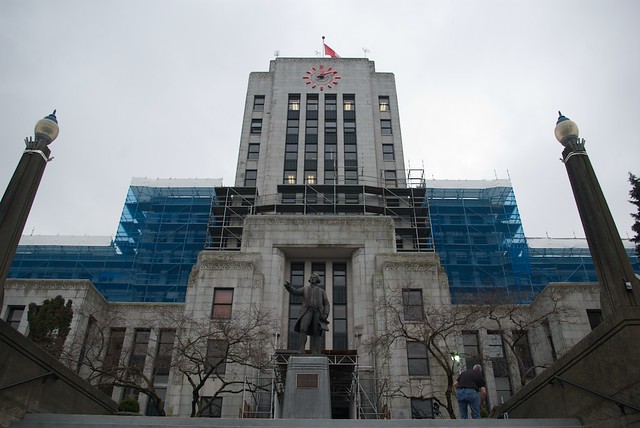Here are five basic things you’ll need to know to guide you through the fog of the 2011 Vancouver civic election campaign
1. Both the NPA and Vision Vancouver are bankrolled by developers
The most powerful thing the city does is make decisions about how land is developed. The city decides what kind of development is allowed on a given property, and how big. This is called “zoning,” which largely determines the value of the property. The city can also decide to change what’s allowed on a given property, thereby changing its value — “rezoning.” In short, big developers donate millions of dollars to municipal parties with the expectation that the parties will help increase the value of developers’ properties.
Both the Non-Partisan Association (NPA) and Vision Vancouver are bankrolled by big developers. As Vision’s Geoff Meggs said in an interview with The Mainlander this week, of the millions of campaign contributions to his party, “the lion’s share comes from developers.” Vision split from COPE in 2005 in part because of the Vision faction’s pro-developer strategy. In 2005, of Vision Vancouver’s $1.3M in campaign contributions, a full $984,000 was from corporations — largely developers. By comparison, of $525,740.81 raised by COPE during its 2005 campaign, only $25,763 was from corporations. In 2008, Vision raised $1,704,258.81 during, and another $433,560.83 after the election. About 60% of this was from corporations, including half a million from developers (for a breakdown see here). At Vision’s recent fundraising gala at the Westin Bayshore, Nov 3 2011, the list of attendees is dominated by developers.
The Non-Partisan Association has always been a developer party. During the 2008 campaign, the developer donations to the NPA equaled that of Vision: half a million dollars. The NPA’s current fundraising manager is Rob MacDonald, a right-wing developer and realtor. MacDonald’s fundraising pitch of September 2011, directed at developers, claimed that it is “unconstitutional” for the city to tax developers at all! The NPA expects to raise $2.4 million this campaign.
2. Despite the talk, neither the NPA or Vision will take action to alleviate the affordability crisis
No matter which way you slice it, Vancouver is one of the most unaffordable cities in the world. A recent RBC report showed that the average family would have to fork out over 90% of their income to buy an average bungalow, and over 50% of their income for an average condo. CMHC defines “affordable” as having to pay no more than 30% of household income on one’s housing.
The big developers need prices to stay high in order to ensure maximum profits. To protect these donors, the NPA and Vision will go to great lengths to maintain the unaffordable status quo. If you watched Wednesday’s CBC mayoral debate, you would have strained to tell the difference between Robertson and Anton’s approaches. It’s like trying to differentiate between Pepsi and Coke at a taste-test — the difference is that there is no difference!




